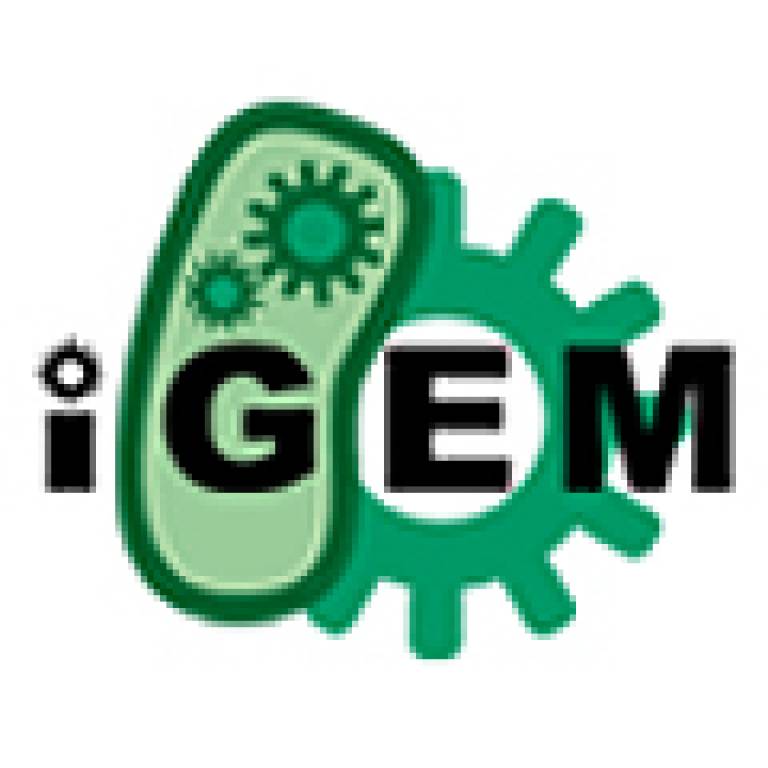UCL takes silver medal at biology competition
3 December 2009
Links
 ucl.ac.uk/biochemeng/" target="_self">UCL Biochemical Engineering
ucl.ac.uk/biochemeng/" target="_self">UCL Biochemical EngineeringUCL undergraduates have won a silver medal at the prestigious International Genetically Engineered Machines (iGEM) competition hosted by the Massachusetts Institute of Technology (MIT).
iGEM is an annual, undergraduate synthetic biology design competition. This year more than than 100 teams entered worldwide from internationally leading universities.
UCL Biochemical Engineering sponsored second-year Biochemical Engineering undergraduates Anike Akinrinlade and Axel Nystrom, and also funded second-year student Xiang Chen from the Research Department of Structural & Molecular Biology to form the first ever UCL team to participate in iGEM.
Laboratory work was conducted throughout the summer at the Advanced Centre for Biochemical Engineering (ACBE) before the final iGEM jamboree event at MIT in November.
The impetus to enter iGEM 2009 came from Axel Nystrom, now in his third year in Biochemical Engineering and planning to embark on a synthetic biology research degree upon graduation. Axel said: "We are all slightly shocked at our success, given that its the first year that UCL entered the competition, and the small size of our team compared to some universities which fielded teams with 15 or more members."
Anike Akinrinlade, who hopes to work in the biofuels industry after graduation, was also elated at the team's achievements. She commented: "I believe it was our focus on pragmatic and relevant issues in the real world of medicines manufacture that gave us the edge over many other teams. Synthetic biology is still in its infancy, so applied work is relatively rare. iGEM 2009 also gave me an opportunity to express my creative side, designing a mascot, team apparel and producing an innovative presentation."
Xiang Chen hopes to do a pure research degree in the US next year. She said: "iGEM 2009 provided a great opportunity to develop further my molecular biology bench skills. With the project I gained experience of several bioprocess manufacturing and analytical devices that I otherwise wouldn't have encountered in a pure research setting. I also got to test my skills as an entrepreneur with some of our fundraising efforts. All the hard work helped build a great team spirit, and the visit to Boston was a lovely experience."
The UCL team - called 'Stress Busters' - set themselves the task of constructing a new type of E. coli cell with an in-built stress-sensor circuit made by assembling a new synthetic network of genes. This so-called 'Traffic Light Stress Sensor' would express fluorescent proteins of different colours in response to different stimuli which were inhibiting growth or protein production. The synthetic stress-sensor technology would ultimately be deployed in commercial E. coli strains commonly used in drug manufacturing, in order to boost productivity and reduce the cost of drug production.
Each iGEM team was supported by staff instructors who guided the students through the experience. The UCL Stress Busters were supported by Drs Eli Keshavarz-Moore and Darren Nesbeth from UCL Biochemical Engineering and Professor John Ward of the Research Department of Structural & Molecular Biology. Dr Nesbeth said: "The iGEM ethos is to guide the students, but also to let them make their own mistakes. As a new Lecturer, I found this summer's work with the iGEM students particularly valuable and rewarding; a great opportunity to hone my teaching skills."
In addition to the research element, iGEM teams are also judged on their ability to explore the ethical conundrums created by the possibilities of synthetic biology. Media skills are also an essential for success. Dr Keshavarz-Moore commented: "The iGEM remit fits UCL perfectly in that it encourages enquiry across multiple disciplines. Students of drama, economics, business, computing, the arts, law, history, engineering, science, mathematics, medicine and the environment, can all contribute to a successful UCL iGEM team for 2010. The Department of Biochemical Engineering welcomes all comers."
Financial support for UCL's iGEM 2009 team was also provided by Eli Lilly, Lonza Biologics and the Health Protection Agency, which are all partners in the Innovative Manufacturing Research Centre programme within UCL Biochemical Engineering.
For more information about iGEM, follow the links above, or contact Darren Nesbeth for details of iGEM 2010.
Image: The iGem Stress Busters team outside the MIT Ray and Maria Stata Center for Computer, Information and Intelligence Sciences
UCL context
The Innovative Manufacturing Research Centre at UCL focuses on improving and enabling manufacture of so-called 'next generation' medicines such as potent protein products, gene therapy vectors and new classes of vaccine. Its work also has major implications for fields as diverse as biofuels and regenerative medicine.
The Advanced Centre for Biochemical Engineering is a globally recognised centre of excellence in linking bioscience insight to bioprocesses understanding, enabling research discoveries to be directly translated into real healthcare outcomes.
Related stories
bioProcessUK presents inaugural Peter Dunnill Award
Wellcome Trust and Merck joint venture to develop affordable vaccines for low-income countries
 Close
Close

